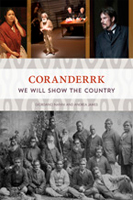Coranderrk: We will show the country
Summary
The Aboriginal people of Coranderrk reserve in central Victoria waged a sustained campaign for justice, land rights and self-determination in colonial Australia. Despite having created an award-winning farm they were targeted for removal. Their lobbying of government, with their white supporters, triggered a Parliamentary Inquiry in 1881.
Coranderrk: We will show the country derives from a verbatim-theatre performance where professional actors brought to life the Inquiry’s witnesses.
In Coranderrk their powerful petitioning, including the renowned William Barak, can be read alongside that of their non-Aboriginal allies, as well as the Aboriginal Protection Board and greedy local pastoralists who wanted them removed.
Coranderrk includes a historical introduction, biographies of the witnesses, and a range of historical images and stills from a theatrical production.
Giordano Nanni is a writer, historian and Senior Research Fellow in the School of Social & Political Sciences at the University of Melbourne.
Andrea James is a Yorta Yorta/Kurnai playwright, director and theatre maker specialising in the development and presentation of Aboriginal Arts and Culture.
Reviews and endorsements
'To hear and see the words as they were spoken in 1881 will give the reader a better appreciation of how remarkable the Inquiry actually was.
The richness of character of all the people participating in the Inquiry becomes so evident through the use of the verbatim script. Each person — a real person — involved in the Inquiry was an active participant in the development of Australia’s fledgling identity.
Coranderrk will raise the public consciousness of the Inquiry and its importance for the future generations of Australians. The Inquiry itself demonstrates how the colony (and then Australia) struggled with new conceptions of equality and inclusiveness as evidenced by the first-hand testimony of women and ‘natives’. The voices of women and Indigenous peoples are so clear in this book — it is easy to place their voices in the national narrative that has been missing.
This book brings the past into the present with the hope of understanding a clearer pathway for the future. That pathway is a better understanding of our governing institutions and psyche of the nation and it resides within the words of the Inquiry and in this book.'
— Dr Mark McMillan, Melbourne Law School, the University of Melbourne
'Coranderrk is a word from my Granny Jemima’s Pangerang language. This beautiful small stemmed bush grows along the banks of the Murray as it does by the Birrarung in Healesville. It blooms in December with sprays of tiny cream and mauvish coloured bell-shaped flowers; the whiteman call it the prosthanera Lasianthos. When I picture the glistening ripples of the river and the subtle fragrance of this plant, I feel relaxed and peaceful. Perhaps this was what my Granny hoped for, given she, like so many other children, was taken from her family, classed an orphan child and sent to Coranderrk.'
— Aunty Joy Murphy Wandin, descendant of the last Aboriginal person to leave Coranderrk
